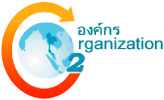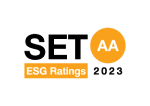
Goal 12: Ensure sustainable consumption and production patterns
Targets 12.2: By 2030, substantially reduce waste generation through prevention, reduction, recycling, and reuse.
Target 12.6: Encourage companies, especially large and transnational companies, to adopt sustainable practices and to integrate sustainability information into their reporting cycle.
|
- Utilizing resources efficiently, reducing waste at source, and managing waste appropriately for least impacts. The targets are set to reduce Ratchaburi Power Plant’s water consumption per unit of distributed electricity by 1% and maintain each power plant’s heat rate at the prescribed level. In 2024, Ratchaburi Power Plant’s water consumption per unit of distributed electricity decreased by 0.7% from the previous year while the heat rate of 4 power plants (50%) met the target.
- Managing waste appropriately, in 2024, Songkhla Biomass Power Plant used tree root waste as fuel, further reducing waste volume by 2.5%. Other power plants used external waste processors’ disposal services, instructed them to start with reuse or recycling. The rest of waste is then incinerated for energy or burnt without energy. All avoid sending leftover hazardous waste to landfills, resulting in a 92% decrease in hazardous waste to landfills.
- Preparing the annual Sustainability Report in alignment with the GRI Standards to disclose the sustainability operations of the Company Group and obtaining the assurance statement from external verifiers.
|

Goal 13: Take urgent action to combat climate change and its impacts
Targets 13.3: Improve education, awareness-raising and human and institutional capacity on climate change mitigation, adaptation, impact reduction and early warning
|
- Steering forward the Climate Change strategy and follow the Decarbonization Roadmap to reduce direct and indirect emissions and remove greenhouses gases. The Company Group’s personnel received the capacity-building training on Carbon Footprint for Organization calculation, internal carbon pricing, TCFD disclosure framework, and the requirements under the Climate Change Act.
- Collaborating with communities in mitigating climate impacts, with the education on GHG removals and supports to related activities. In 2024, RATCH continued its collaboration with various parties in terrestrial and mangrove reforestation, to increase forest areas and carbon sinks and carbon credits. It also supported forest preservation through the Love the Forests and the Community Project, with knowledge in the management, development, restoration and maintenance of community forest and ecosystems, for biodiversity, GHG sequestration, dust absorption and protection against natural disasters.
|

Goal 14: Conserve and sustainably use the oceans, seas and marine resources for sustainable development
Target 14.2: Sustainably manage, and protect marine and coastal ecosystems to avoid significant adverse impacts, including by strengthening their resilience and taking action for their restoration, to achieve healthy and productive oceans.
|
Collaborating with the Department of Marine and Coastal Resources in expanding mangrove forests in Chanthaburi province, to reduce coastal erosion, build the habitat and nursery for aquatic lives, and enhance biodiversity. The 113.47-rai reforestation area was registered under TGO’s T-VER Scheme in 2024, with estimated GHG sequestration capacity of 3,120 tCO2e in a 10-year period (2023-2033). It is also expected to enhance the ecological balance.
|

Goal 15: Protect, restore and promote sustainable use of terrestrial ecosystems, sustainably manage forests, combat desertification, and halt and reverse land degradation and halt biodiversity loss
Target 15.1: Ensure the conservation, restoration and sustainable use of terrestrial and inland freshwater ecosystems and their services, in particular forests, wetlands, mountains and drylands, in line with obligations under international agreements.
Target 15.2: Promote the implementation of sustainable management of all types of forests, halt deforestation, restore degraded forests and substantially increase afforestation and reforestation globally.
|
- Collaborating with the Department of Royal Forest in increasing green areas and reinforcing community strength through engagement in community forest and biodiversity management. The project, covering 6,034 rai, calls for the reforestation on degraded areas and community forest preservation and is expected to sequester 23,064.75 tCO2e of greenhouse gases throughout the 15-year period. It is also expected to raise conservation awareness and create ecological balance and economic benefits to the communities.
- Supporting Mae Fah Luang Foundation under Royal Patronage’s 11,000-rai community forest conservation project. Implemented in collaboration with communities, the project is expected to create carbon credits, restoring forest biodiversity and reinforce community strengths.
|








